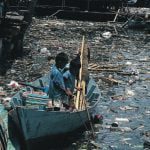If you eat fish then you are eating plastic. That’s what an eminent international team of scientists concluded earlier this month.
Researchers were perplexed after monitoring 141 ocean sites. They couldn’t find 99 percent of the plastics on the surface they expected.
The United Nations Environment Program estimates that there are 12,000 pieces of plastic for every square mile of ocean. Plastic in the oceans breaks down into tiny pieces called micro-plastics. It turns out those micro-plastics are potent sponges attracting the following poisons: DDT, methylmercury, PCBs, insecticides, flame retardants, Bisphenol As, phalates and TBTs, or anti-fouling hull paints.
Those micro-plastics resemble tiny zooplankton or animals and eggs, which larger fish consume. At each level of the food chain those toxins are bio-magnified; concentration is the highest for the apex or top predator. Humans, by the way, are apex predators. If you needed a reason for your family to become vegetarian, I suggest that you take this latest staggering ocean discovery to heart and make the switch now.
There’s no waste in nature. There’s no unemployment in nature. Everything works and everything eats; it’s all interconnected and interdependent. In fact, nature is a flawless model for humans to follow as we approach 8 billion people and dwindling natural resources.
Human ingenuity and innovation is our hope and future if we are to survive this century.
Entrepreneurs are risk-takers. They view change as opportunity in disguise. For instance, at New York Fashion Week RAW for the Oceans, Pharrell Williams, owner of Bionic Yarn, recently announced a long-term sustainable collaboration with G-Star RAW that makes something fantastic with ocean plastic.
“The Vortex Project is a collaboration between eco-material innovator Bionic Yarn, Sea Shepherd Conservation Society and Parley — for the Oceans. A spiffy line of denim with repurposed ocean plastic will go on sale next month in G-Star Raw stores.
In the meantime, I fervently believe it’s up to each of us to lend a helping hand and dramatically cut back on the amount of plastics we use.
Take the Earth Carer’s challenge and make it a plastic-free July!
Earth Dr Reese Halter is a broadcaster, biologist and author of the upcoming book “Shepherding the Sea: The Race to Save Our Oceans.”

